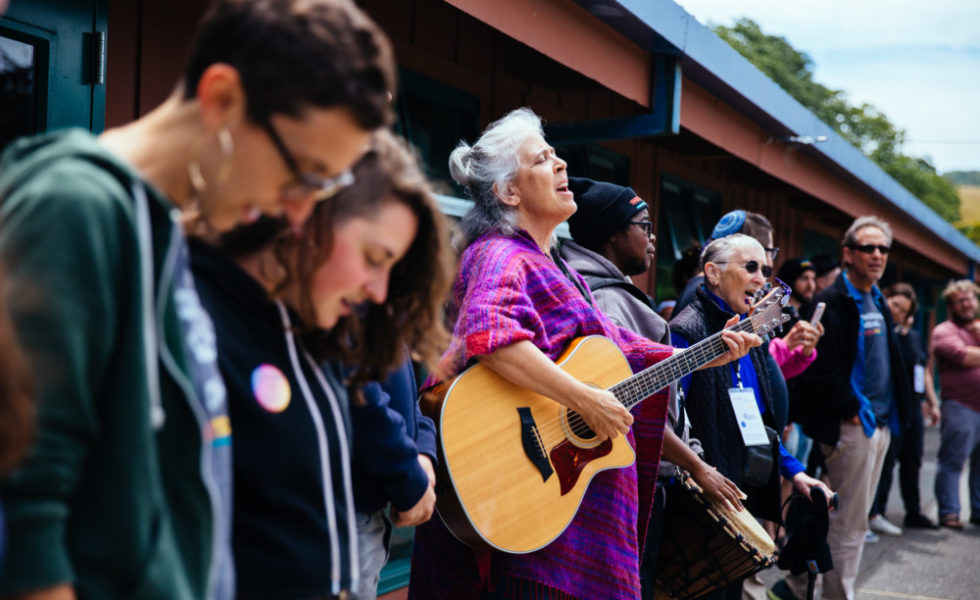Reading Megillah As An Invitation to Take Action

by R’ Melanie Levav, SVAVA Board Member
Between the war in Ukraine, anti-trans legislation in Texas, the end of mask mandates that protected our most vulnerable, “don’t say gay” to a young kid in Florida, and God only knows what else, it feels like once again, the world has literally turned upside down.
In Russia, a law was passed that makes it illegal to call the current war a war, and in Florida, legislation was passed that prohibits teachers from using the word gay among younger elementary school students. If we deny reality, does it really make it go away? That’s a rhetorical question.
If studying Talmud might offer a balm for the pain of the wars against innocents, count me in. So I took a look at the first few pages of tractate megillah and immersed myself in the Rabbis’ musings about when we should celebrate the world turning upside down for good against evil, and in particular, when we should read the megillah, recounting the story of Purim. In Megillah 4a we read:
ָאמר רבי חלּבֹו אמר עּולא ביָרָאה: חיָיב אָדם לקרֹות את המגילה בליְלה וְלשנֹותה בּיֹום, שּנֱֶאמר: למען יְזמרָך כבֹוד וְֹלא יִּדֹום ה׳ אֹלהי לעֹולם אֹוֶדך
Rabbi Ḥelbo said that Ulla Bi-ra’a said: A person is obligated to read the Megillah at night and then repeat it during the day, as it is stated in a prooftext: “So that my glory may sing praise to You and not be silent; O Lord, my God, I will give thanks to You forever” (Psalm 30:13.)
Huh? That we should read the megillah twice on Purim is proven because of a verse in a psalm that tells us we should both sing praise AND not be silent? Feels like a stretch, but I got curious about the choice of this psalm in particular to underscore the obligation to read megillah at night and then again in the day. I mean, we SVARA-niks get it… chazara is the key to unlocking the mysteries of the text, so sure, we should read the megillah twice on Purim, not just once, for fuller effect and greater opportunity to internalize the story and its lessons.
Psalm 30 is included in our liturgy, and there’s a different line that makes this psalm memorable for me—the one that talks about turning mourning into dancing. It’s the idea of turning mourning into dancing that I struggle with, especially in light of the current state of the world.
Side note: Debbie Friedman, may her name continue to be a blessing, wrote a song not long before she died using this psalm, “You turned my mourning into dancing.” It’s a great song.
So as is traditional when we seek to understand something in our Torah study, I turned to our commentator Rashi on this psalm. Because, as I learned in Queer Talmud Camp, Rashi is your friend.
Rashi comments, “Our Sages explained the entirety of Psalm 30 as referring to Mordechai, Esther, and Haman, in a section of midrash.”
How fabulously helpful. Rashi tells us, You turned my lament into dancing was said not only by Mordechai, but by all of Israel in the megillah.
So I got a little more curious. What did Mordechai say, and is it really taken from this psalm?
Esther chapter 9, nearing the end of the story, verses 20-22:
Mordechai… sent dispatches to all the Jews throughout the provinces of King Ahasuerus, near and far, instructing them to observe the fourteenth and fifteenth days of Adar, every year—the same days on which the Jews enjoyed relief from their foes and the same month which had been transformed for them from one of grief and mourning to one of festive joy. They were to observe them as days of feasting and merrymaking, and as an occasion for sending gifts to one another and presents to the poor.
So the connection between Psalm 30 and megillat Esther is this word hafach, the idea of things being turned upside down. In this case, from negative to positive, from bad to good. But both texts have the word in a passive state, grammatically speaking. On Purim it was changed for them, nehepach lahem. In Psalm 30, it’s God who does the changing, hafachta mispedi lemachol li.
We know God doesn’t appear as a character in the book of Esther, though we might want to understand God’s presence to be underneath what’s right in front of our eyes.
I’d like to read the similarity in the passive form as an invitation for us to think about how we might embody that action, not waiting for it to happen, but to consider how we participate in the turning ourselves in a more active way.
Which brings us back to the original text I cited in tractate megillah, that we should read the megillah both at night and again the next day because in Psalm 30 it tells us we should praise God and not be quiet about it. If we should praise God and not be quiet about it, how much more so should we speak up against the denial of our existence, and not be quiet about it. That’s what it means to be a player, perhaps. To take an active role in turning things back around, and not to do so too quietly… to share our Torah, our svara, to step up to take action against anti-trans legislation, anti-gay legislation, to not sit idly by while maternity hospitals are being bombed.
As we head into a joyful holiday, I hope you might join me in using the Rabbis’ instruction to read the megillah twice to double down on the sacred opportunity we have to take action against the evils in our world.
 SVARA: A Traditionally Radical Yeshiva
SVARA: A Traditionally Radical Yeshiva